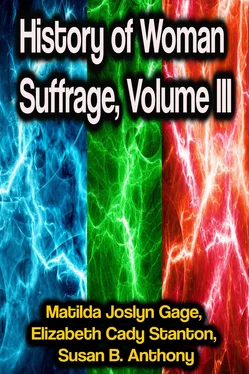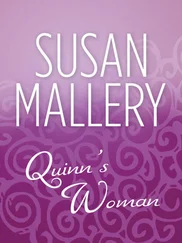Gentlemen, when the news of the appointment of this committee was flashed over the wires, you cannot imagine the satisfaction that thrilled the hearts of your countrywomen. After fourteen years of constant petitioning, we are grateful for even this slight recognition at last. I never before felt such an interest in any congressional committee, and I have no doubt that all who are interested in this reform, share in my feelings. Fortunately your names make a great couplet in rhyme,
Lapham, Anthony and Blair,
Jackson, George, Ferry and Fair.
which will enable us to remember them always. This I discovered in writing your names in this volume, which allow me to present you.
The gentlemen rising in turn received with a gracious bow "The History of Woman Suffrage" which, Mrs. Stanton told them, would furnish all the arguments they needed to defend their clients against the ignorance and prejudice of the world. Mr. George of Mississippi asked why this agitation was confined to Northern women; he had never heard the ladies of the South express the wish to vote. Mrs. Stanton referred him to those to whom the volume before him was dedicated. "There," said she, "you will find the names of two ladies from one of the most distinguished families in South Carolina, who came North over forty years ago, and set this ball for woman's freedom in motion. But for those noble women, Sarah and Angelina Grimkè, we might not stand here to-day pleading for justice and equality." As the speakers had requested the committee to ask questions, they were frequently interrupted. All urged the importance of a national protection, preferring congressional action, to submitting the proposition to the popular vote of the several States. On this point Mr. Jackson of Tennessee asked many pertinent questions. Mrs. Shattuck, writing of this occasion to the Boston Transcript , said:
One of the speakers eloquently testified to the interest of many Southern women in this subject, and urged the Southern members of the committee not to declare that the women of the South do not want the ballot until they have investigated the matter. After the hearing three Southern ladies, wives of congressmen, thanked her for what she had said. The member from Mississippi showed a great deal of interest and really became quite waked up before the session ended. But, when we look at it in one light, there is something exceedingly humiliating in the thought that women representing the best intellect and the highest morality of our country, should come here in their grand old age and ask men for that which is theirs by right. Is it not time that this aristocracy of sex should be overthrown? Several of the senators were so moved by the speeches that they personally expressed their thanks, and one who has long been friendly, said the speeches were far above the average committee-hearings on any subject. We might well have replied that the reason is because all the speakers feel what they say and know that the question is one of vital importance.
In securing these hearings before this special committee of the Senate the friends feel they have reached a milestone in the progress of their reform. To secure the attention for four hours of seven representative men of the United States, must have more effect than would a hundred times that amount of time and labor expended upon their constituents. If one of these senators, for instance, should become convinced of the justice of woman's claim to the ballot, his constituency would begin to look upon that question with respect, whereas it would take years to bring that same constituency up to the position where they could elect such a representative. To convince the representatives is to sound the keynote, and it is for this reason that these hearings before the Senate committee are of such paramount importance to the suffrage cause.
At the close of the hearing Mrs. Robinson presented each member of the committee with her little volume, "Massachusetts in the Woman Suffrage Movement."
January 23 the House Committee on Rules[87] gave a hearing to Mrs. Jane Graham Jones of Chicago, Mrs. May Wright Sewall and Miss Anthony. During this congress the question of admitting the territory of Dakota as a State was discussed in the Senate. Our committee stood ready to oppose it unless the word "male" were stricken from the proposed constitution.
Immediately after this most of the speakers went[88] to Philadelphia where Rachel Foster had made arrangements for a two-days convention. Rev. Charles G. Ames gave the address of welcome.
He told of his conversion to woman suffrage from the time when he believed women and men were ordained to be unequal, just as in nature the mountain is different from the valley—he looking down at her, she gazing up at him—until the time when he began to see that women are not of necessity the valleys, nor men of necessity the mountains; and so on, until now he believes women entitled to stand on an equal plane with men, socially and politically.
The President, Mrs. Stanton, responded. Hannah Whitehall Smith of Germantown, prominent in the temperance movement, spoke of the hardship of farmers' wives, and asked:
If that condition was not one of slavery which obliged a woman to rise early and cook the family breakfast while her husband lay in bed; to work all day long, and then in the evening, while he smoked his pipe or enjoyed himself at the corner grocery, to mend and patch his old clothes. But she thought the position of woman was changing for the better. Even among the Indians a better feeling is beginning to prevail. It is Indian etiquette for the man to kill the deer or bear, and leave it on the spot where it is struck down for the woman to carry home. She must drag it over the ground or carry it on her back as best she may, while he quietly awaits her coming in the family wigwam. A certain Indian, after observing that white folks did differently by their women, once resolved to follow their example. But such was the force of public opinion that, when it was discovered that he brought home his own game, both he and his wife were murdered. This shows what fearful results prejudice may bring about; and the only difference between the prejudice which ruled his tribe in regard to woman and that which rules white American men to-day, is a difference in degree, dependent upon the difference in enlightenment. The principle is the same. The result would be the same were each equally ignorant.
The familiar faces of Edward M. Davis, Mary Grew, Adeline Thompson, Sarah Pugh, Anna McDowell and two of Lucretia Mott's noble daughters, gladdened many a heart during the various sessions of the convention. Beautiful tributes were paid to Mrs. Mott by several of the speakers. The Philadelphia convention was supplemented by a most delightful social gathering, without mention of which a report of the occasion would be incomplete:
Like many historical events, this was entirely unpremeditated, no one who participated in its pleasures had any forewarning, aside from an informal invitation to lunch with Mrs. Hannah Whitehall Smith and her generous husband, both earnest friends of temperance and important allies of the woman suffrage movement. Mrs. Smith met the guests at the station in Philadelphia, tickets in hand, marshaling them to their respective seats in the cars as if born to command, and on arriving at Germantown, transferred them to carriages in waiting, with the promptness of a railroad official. Without noise or confusion one and all crossed the threshold of her well-ordered mansion, and with other invited guests were soon seated in the spacious parlor, talking in groups here and there. "Ah!" said Mrs. Smith on entering, "this will never do, think of all the good things that will be lost in these side talks. My plan is to have a general conversation, a kind of love-feast, each telling her experience. It would be pleasant to know how each has reached the same platform, through the tangled labyrinths of human life." Soon all was silence and one after another related the special incidents in childhood, girlhood and mature years that had turned her thoughts to the consideration of woman's position. The stories were as varied as they were pathetic and amusing, and were listened to amidst smiles and tears with the deepest interest. And when all[89] had finished the tender revelations of the hopes and fears, the struggles and triumphs through which each soul had passed, these sacred memories seemed to bind us anew together in a friendship that we hope may never end. A sumptuous lunch followed, and amid much gaiety and laughter the guests dispersed, giving the hospitable host and hostess a warm farewell—a day to be remembered by all of us.
Читать дальше












